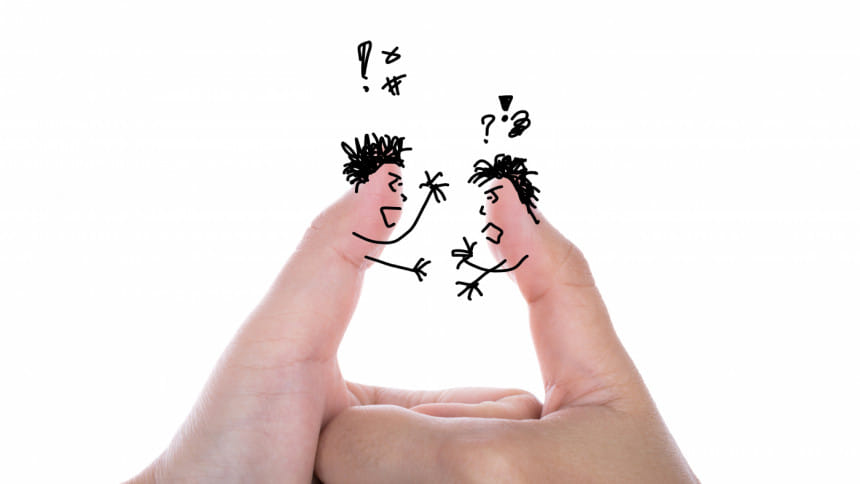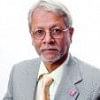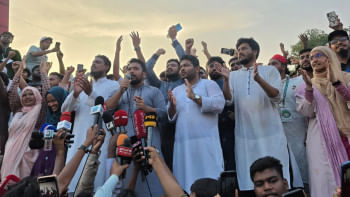Two sides of the Covid

We live in an apartment building of thirty families, and there are possibly five squabbling groups, and eight sub-groups. Among them, one resident believes he himself is one group. He is right. The difficulty to run a wider body, say a mahalla, or a city or a district, and the country can be easily fathomed. Here too I can imagine the opinionated raising his hand, the lady there pointing her angry finger, and the man assembling his lungi verbalising filth, "An apartment and the country is not the same thing". Wasting their time; as if I did not know.
Having said that, everyone having the right to express an opinion is civilisation, but to deliberately adopt a contradictory position every time based on a person can lead to anarchy. That seems to be the norm in our age and time.
Many of us have taken the Newtonian third law in earnest, but interacting humans don't have to be equally forceful as each other. "For every action, there is an equal and opposite reaction" is suitable to inanimate objects. But then we are driven by vain ego that may well be setting us behind in our pursuit to reach the next notch in the world economy order.
One of my colleagues was in the habit of opposing everything said in the room. He did not venture out much. If you began the day's social tea talk with the movie "Sareng Bou" being about starting life afresh on an unpolluted island, he would down three more cups over two hours to convince you and others remaining in the room otherwise before you cowered down on account of being politer. It's not about being right or wrong, it's about not having any respect for another's opinion. However, I gradually mastered the art of winning him over. If I wanted to win an argument, I always began the conversation (one-way tirade after my opening statement) by saying the opposite, and he would fiercely oppose it over three cups of tea. It was win-win for me.
Contextually, although lockdown remains an essential defence worldwide against the spread of Covid-19, there have been exceptions at the cost of human lives. Sweden for one which experimented with openness have admitted to having wronged their people.
Before Bangladesh imposed a lockdown, there was hue and cry about its delay. Soon after the government enforced restrictions on movement to safeguard people's lives, the true colour of the "know all" surfaced. They began to shout, "Why the lockdown?" Some peddled their expertise by refining that to, "Why lockdown in this form?"
Earlier in March, there was a Bangalee blogger living abroad, who was close to tears pleading, accusing, why Bangladesh was not following India (in fighting Covid-19), although he admitted he was against other matters related to our neighbours. I have not seen him blogging since India began to clock the third highest cases of daily infections in the world. Talk about expertise!
Then there were the cold-blooded others who claimed that the virus would not be active at temperatures above twenty-six degrees Celsius. We waited in abated happiness. Unfortunately, at thirty-five and above, Corona was well and thriving.
Then came the theories about medicines that work and the next day they do not. Hydroxychloroquine, an antimalarial drug, for instance, was touted as a possible treatment for Covid-19, but the assertion was soon after withdrawn on account of its ineffectiveness and wider health risks including worsened skin conditions, eye and heart damage.
The virus spreads by remaining on surfaces, up to twelve hours on some. No, it does not. It spreads only by droplets. "No, it can also scatter in the air", also had a short but terrifying stint. The virus does not affect Muslims because of our food habits was one propounded theory. In mid-April Indian officials were blaming an Islamic group for spreading the virus, and Muslims were targeted in a wave of violence. (NY Times)
Mask and no mask have been the cause of discontent and aggressive rivalries. Two presidents downplayed the dangers of the pandemic, and ridiculed the wearing of masks (as if it were an aspersion on their performance) until political back-scratchers Donald Trump and Jair Bolsonaro emerged as leaders of their countries with the highest Covid infections in the world. On a smaller scale, one serious conflict led to the death of a bus driver.
Washing hands with a sanitizer is a must. A few days later, actually, any soap will do. Washing hands for twenty seconds each time was a popular advice taken in wide strides. Widest perhaps was by a TV channel that advised viewers to wash hands for twenty seconds twenty times a day. Why?
Opening the malls would be a disaster. Not opening will kill more people. Public transport will help spread the disease. Without buses, how can people go to work? Bangladeshi workers in foreign countries are in dire straits. In late April World Bank predicted sharpest decline of global remittances in recent history by about 20 percent in 2020 due to the economic crisis induced by the Covid-19 pandemic and shutdown. At the peak of Covid-19, the remittances (inflows of migrants' and short-term employee income transfers) in Bangladesh reached an all-time high of USD 1,832.63 million in June of 2020. We are all scratching our heads.
In this war against an adversary of unknown strength, many paradoxical statements made headlines. In the build-up to Eid-ul-Fitr, the self-proclaimed specialists painted a rather grim picture of Bangladesh. That the largescale migration of unprotected workers in jam-packed ferries and buses would result in unprecedented escalation of Covid cases. That they should not be allowed to return to the cities. That over two months have passed and nothing in the line of their negative psyche occurred was one way to silence them.
Opinions either way are not based on any scientific study. It's all about creating sensation to steal the limelight. They lust in dominating the situation with half-baked, hearsay information. One thing good about these "experts" is that they learn their lesson quickly. They have not mongered fear before the Eid-ul-Adha. Let us pray they are proven wrong again.
In spite of our cultural idiosyncrasies, a couple of scenarios remain beyond controversy, and are not divided by differing opinions or partisan bias. While on the one hand, there are gallantry heroes among medical professionals and health workers of all levels, the failure of the health ministry and its directorate cannot be underplayed. It merits declaration here that Covid-19 has also begotten heroes among policepersons, politicians, and social workers.
By definition opinion is "a view or judgement formed about something, not necessarily based on fact or knowledge". There you go! The media will continue to highlight the opinions of the minister, and hardly ever the secretary. All this, while the real professional authority in the ministry or in one of its committees or outside is seldom queried about his wisdom on a pertinent issue.
The author is a practising Architect at BashaBari Ltd., a Commonwealth Scholar and a Fellow, a Baden-Powell Fellow Scout Leader, and a Major Donor Rotarian.

 For all latest news, follow The Daily Star's Google News channel.
For all latest news, follow The Daily Star's Google News channel. 



Comments